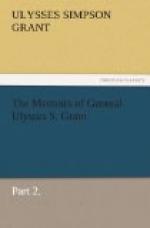Now, the right of revolution is an inherent one. When people are oppressed by their government, it is a natural right they enjoy to relieve themselves of the oppression, if they are strong enough, either by withdrawal from it, or by overthrowing it and substituting a government more acceptable. But any people or part of a people who resort to this remedy, stake their lives, their property, and every claim for protection given by citizenship—on the issue. Victory, or the conditions imposed by the conqueror—must be the result.
In the case of the war between the States it would have been the exact truth if the South had said,—“We do not want to live with you Northern people any longer; we know our institution of slavery is obnoxious to you, and, as you are growing numerically stronger than we, it may at some time in the future be endangered. So long as you permitted us to control the government, and with the aid of a few friends at the North to enact laws constituting your section a guard against the escape of our property, we were willing to live with you. You have been submissive to our rule heretofore; but it looks now as if you did not intend to continue so, and we will remain in the Union no longer.” Instead of this the seceding States cried lustily,—“Let us alone; you have no constitutional power to interfere with us.” Newspapers and people at the North reiterated the cry. Individuals might ignore the constitution; but the Nation itself must not only obey it, but must enforce the strictest construction of that instrument; the construction put upon it by the Southerners themselves. The fact is the constitution did not apply to any such contingency as the one existing from 1861 to 1865. Its framers never dreamed of such a contingency occurring. If they had foreseen it, the probabilities are they would have sanctioned the right of a State or States to withdraw rather than that there should be war between brothers.




